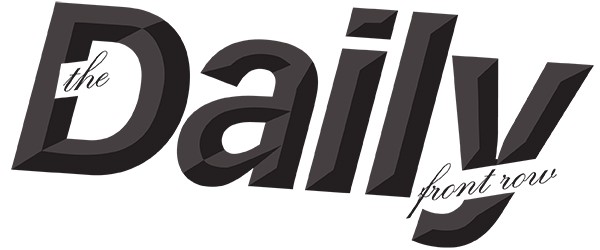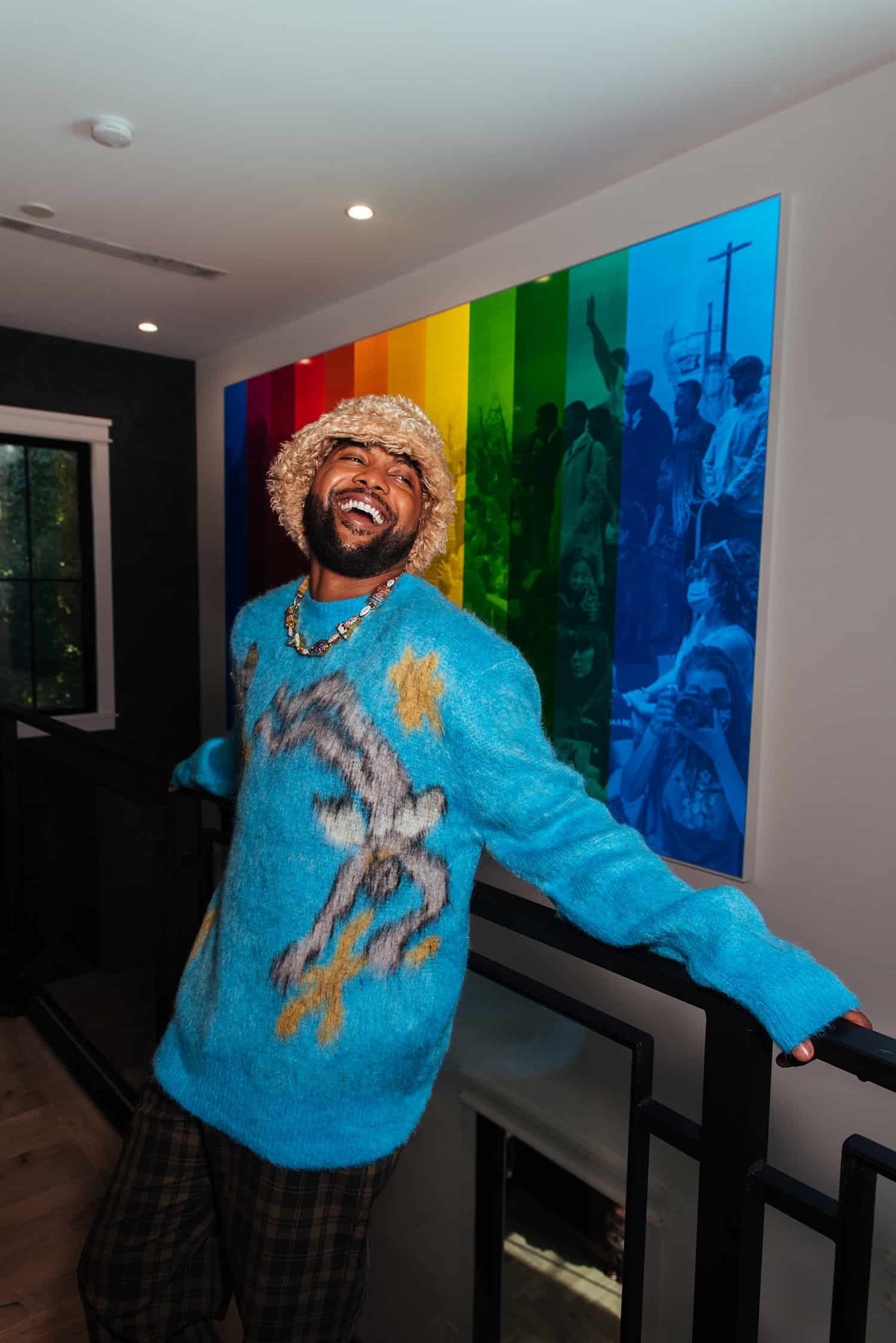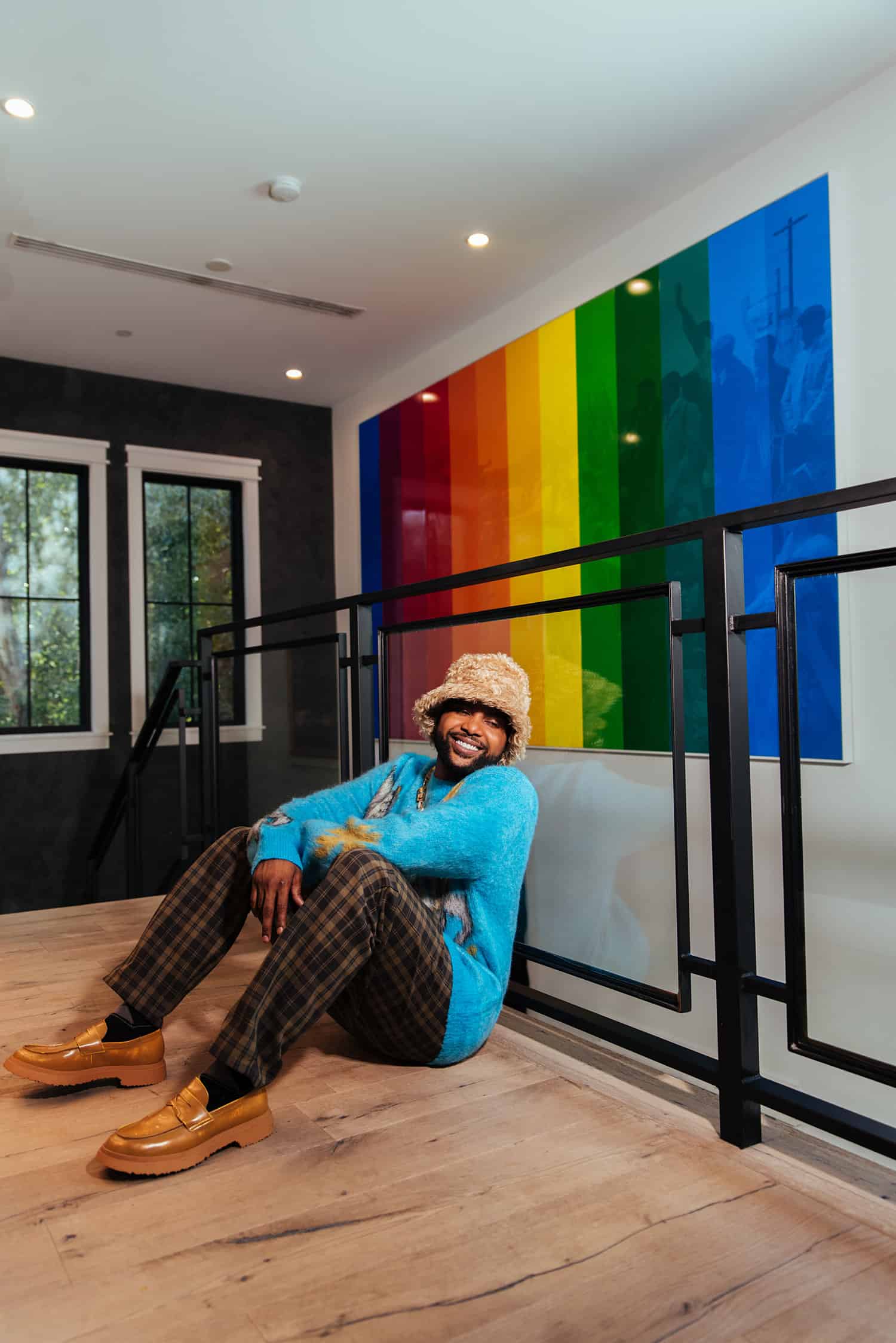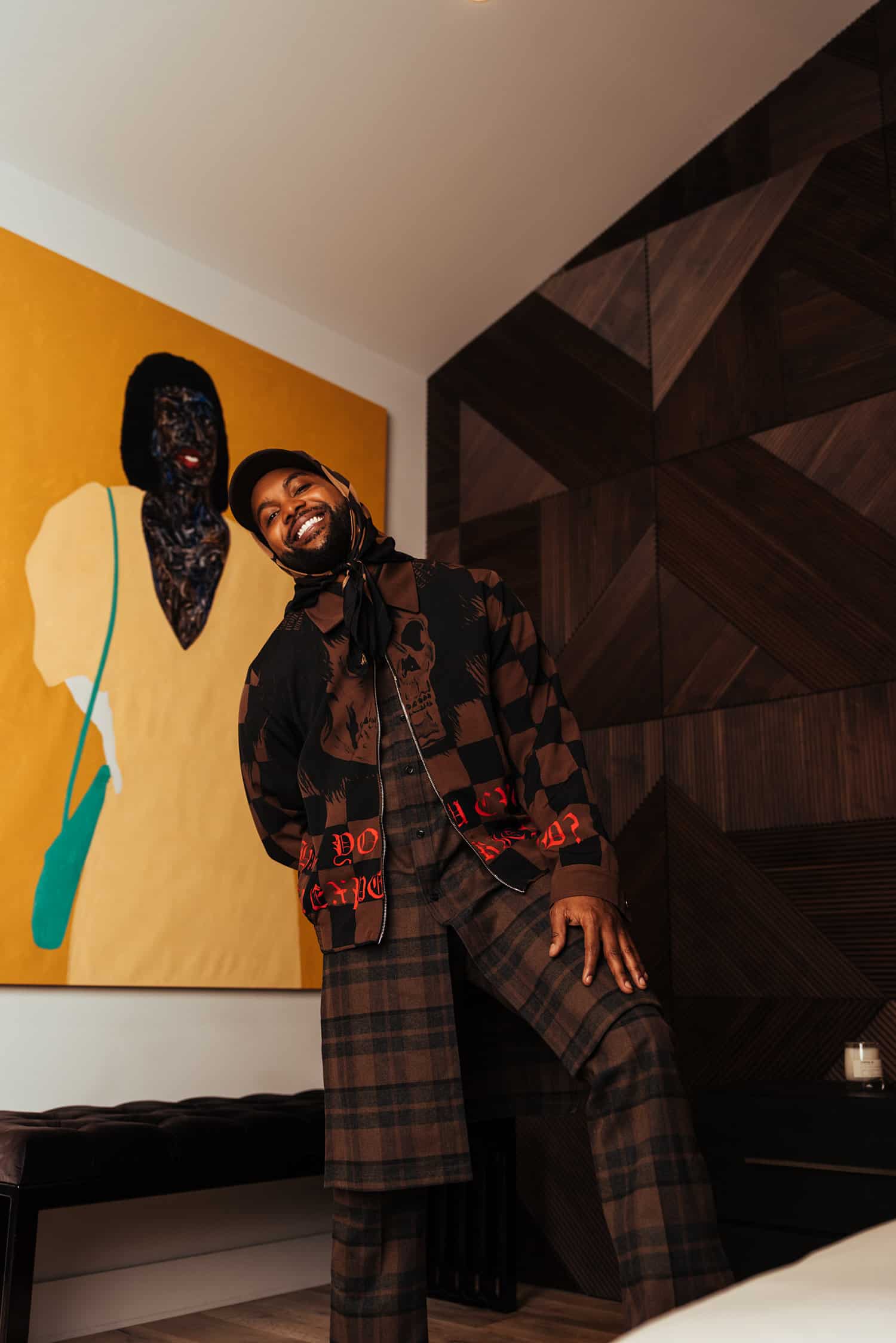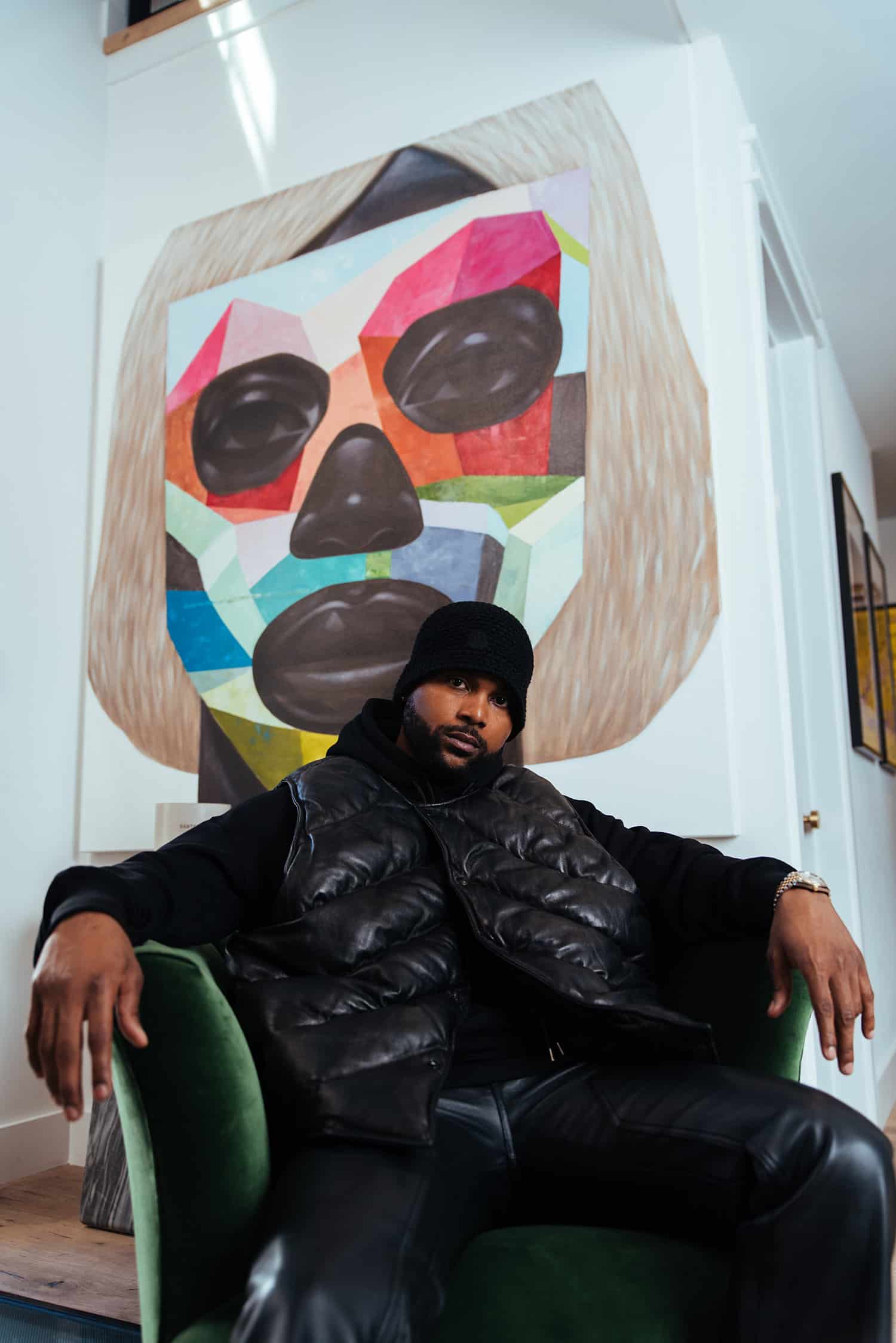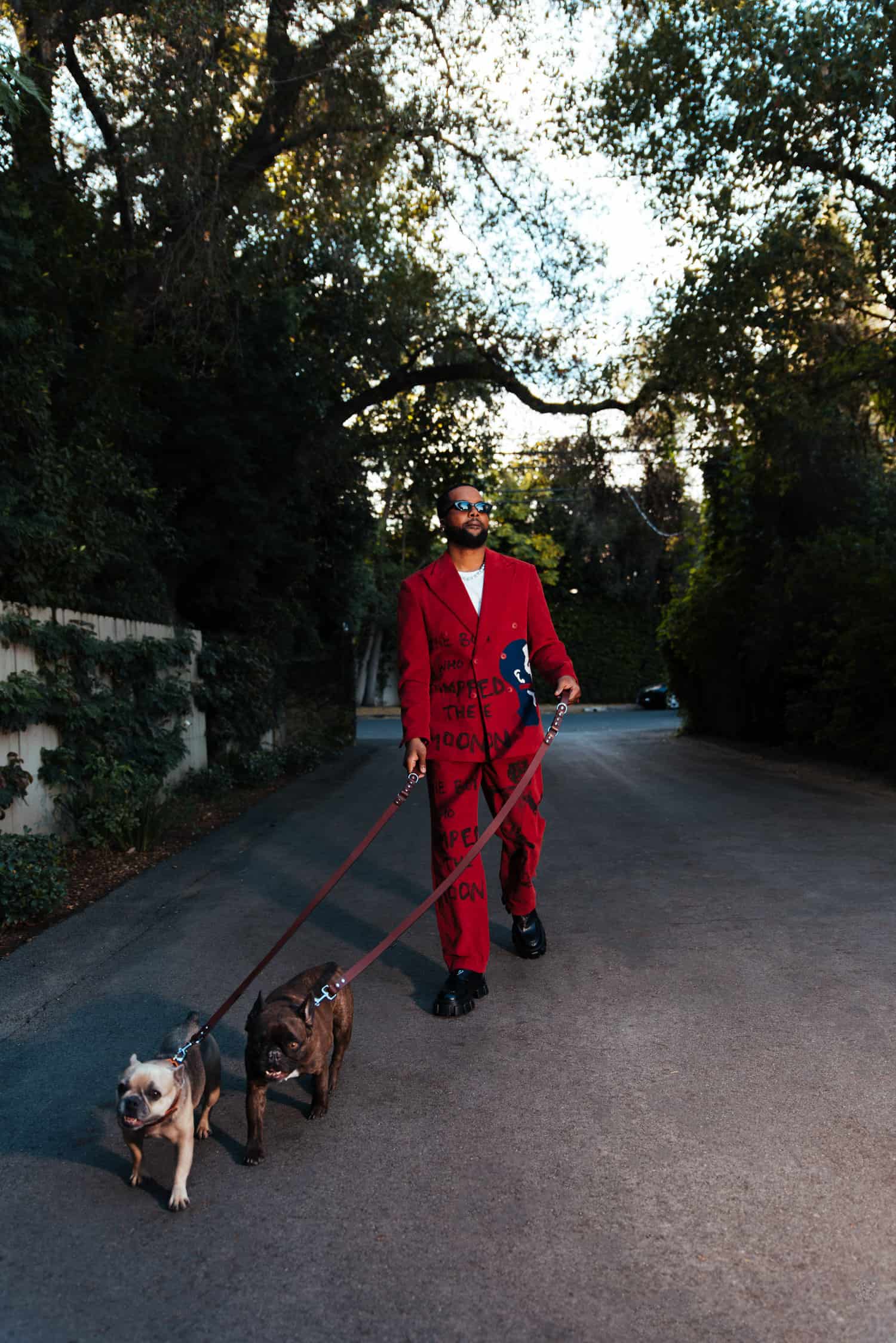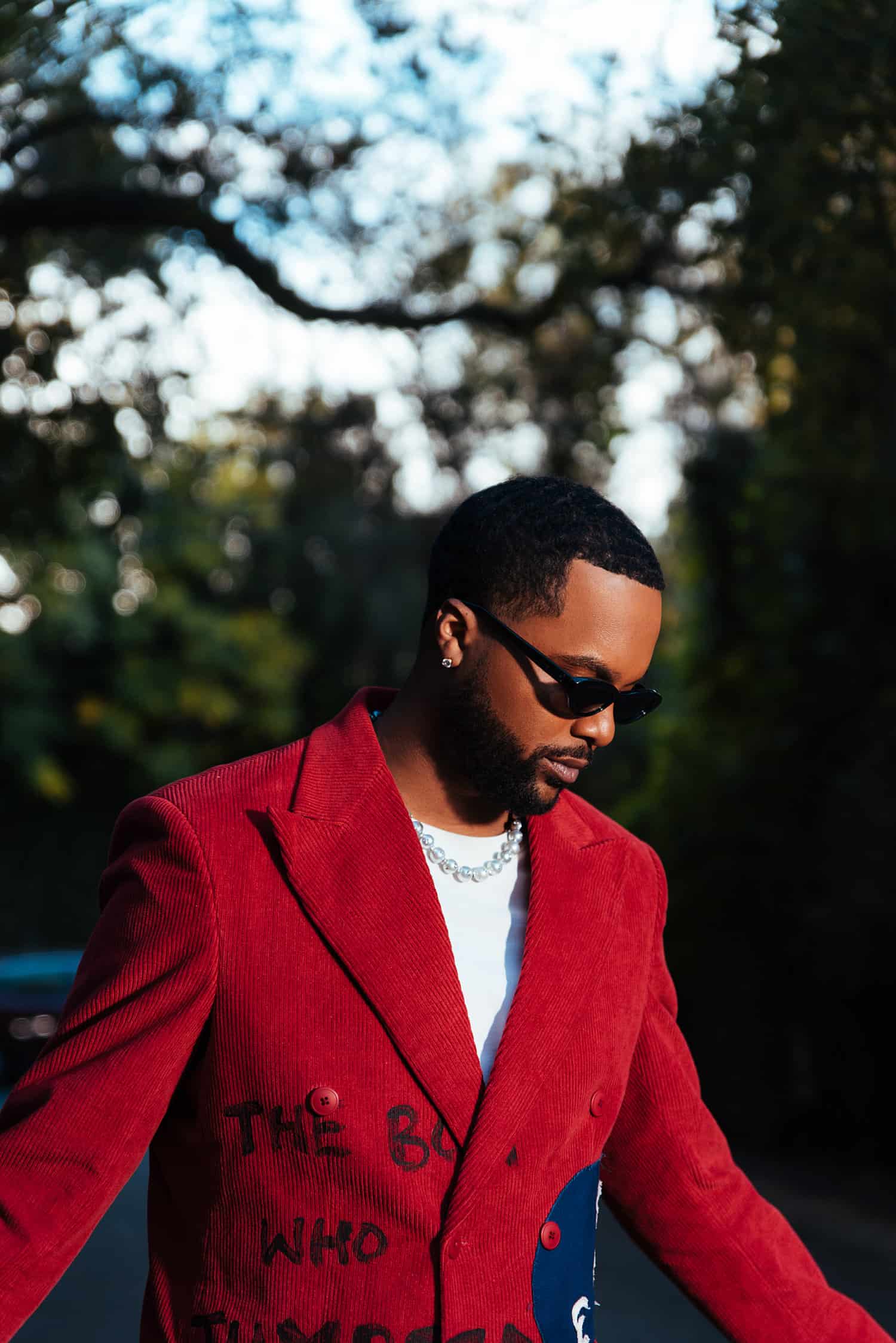How can you summarize Sterling “Steelo” Brim’s career in a box with a neat little bow on it? Well, you can’t—and that’s intentional. Never one to accept what he could or couldn’t achieve, the Chicago native has forged a dynamic career that spans television, music, podcasting, producing, and more—thanks to his can-do attitude and larger-than-life charisma. But if you want to know what’s really inspiring him these days, beyond his love for the entertainment industry, it’s his impressive and thought-provoking art collection. Let’s just say, we had a lot to talk about. Here’s where it started—and where it’s going.
Take us back to growing up in Chicago. What kind of kid were you?
I was a small but confident kid! I probably overcompensated with my personality because of that. I was always creative, artistic, and athletic. My parents kept me busy, because that was the way to keep us safe.
You’ve said you got your sense of humor from your family, too.
My whole family is goofy and funny—very outspoken! They kept me on my toes growing up. Being around the table with my family is always insanity; everyone believes they’re correct.
You had your first piece of art published when you were age 5. What type of career did you initially think you’d pursue?
It was a little drawing that I’d done. The piece was only published in a Chicago school magazine or newspaper or something, but I was interested in art as a kid for sure. Art and creating is what I care about the most. For a 5-year-old, it was cool at the time. Looking back, I remember it being a big deal. I’d drawn a boat and myself on a boat fishing—fishing for books! “Literature in the water,” I wrote down, “hooked on reading.” It was a pretty brilliant thing for a 5-year-old to put this together. I definitely was creative, and I loved being the center of attention for a minute.
What were some fateful moments that put you on course to the entertainment industry?
Jokingly, I say the movie Hardball, which I was in when I was 12. Just because I was good at baseball! But it opened my eyes to the world in general, opportunities I’d never even known about, being a kid from the West Side of Chicago. People would say, “You’ve a great personality,” but I didn’t have the access or knowledge. That was my first time seeing what the other side felt like, and I thought, “This is interesting.”
How did you get cast in the movie?
I was ranked in the state for baseball. We didn’t even have a school team—there was no funding for a public school team—but I played in the Garfield Park and Franklin Park Little Leagues and when the audition was going on, the principal called my house. I’m thinking I’m in trouble! It was a rather tough audition for a kid. You couldn’t miss because if you did, you were out! But [the experience] gave me hope as an inner-city Black kid. I’d always dreamed of what was on the outside, and this was just a glimpse.
What came next?
I had some talent agencies reach out. People were thinking, “This kid’s collecting checks with no agent!” I remember them contacting me off that and saying, “There’s more you could be doing.” I went back to school and gained the nickname “Hollywood.” Because I was kind of a showboat. It fit, as well. As a kid, there’s a lot that comes with that kind of attention—envy and people thinking that you think you’re better than them.
Tell us the backstory to Ridiculousness, and your journey on the show over the past decade.
I working in A&R when I met Chris “Drama” Pfaff, the cousin of Rob [Dyrdek, host/ creator], who was trying to form a publishing and production company. He knew I was kind of a hustler on the ground, running at all times and I had a network. I was 19 or 20, just trying to figure out my next dollar, but I had a network. Rob came to the studio twice and I was just being myself…probably loud and obnoxious! [Laughs] He saw something in me and said, “Hey dude, I think you’re funny. I’ve been looking for a co-host.” It sounds like a BS story, but it’s true! I thought it was just Hollywood talk and I’d fake that I’m interested. I didn’t think anything would come to fruition. But months later, he called me and said they would start filming at 10 a.m. tomorrow and could I be there. I’d never been on TV; I had no prep and no experience. But life is about opportunities in small windows—and the rest is history! We’re 11 years in now.
It’s a great story. Would you ever write it as a show of its own?
Well, I’d maybe write it in a more digestible way. All of us who are living in this capacity are aware that unless there’s something crazy, our lives are interesting, but not that interesting! I don’t really see my life as the story.
What does the next era of Ridiculousness look like?
The plan is for us to continue on. If it ain’t broke, no need to fix it. The show has evolved into a more pure form, so we’ll continue to do that. Turn it on, people get it— this is you, America! This is how you look! That allows it to be successful as people can laugh.
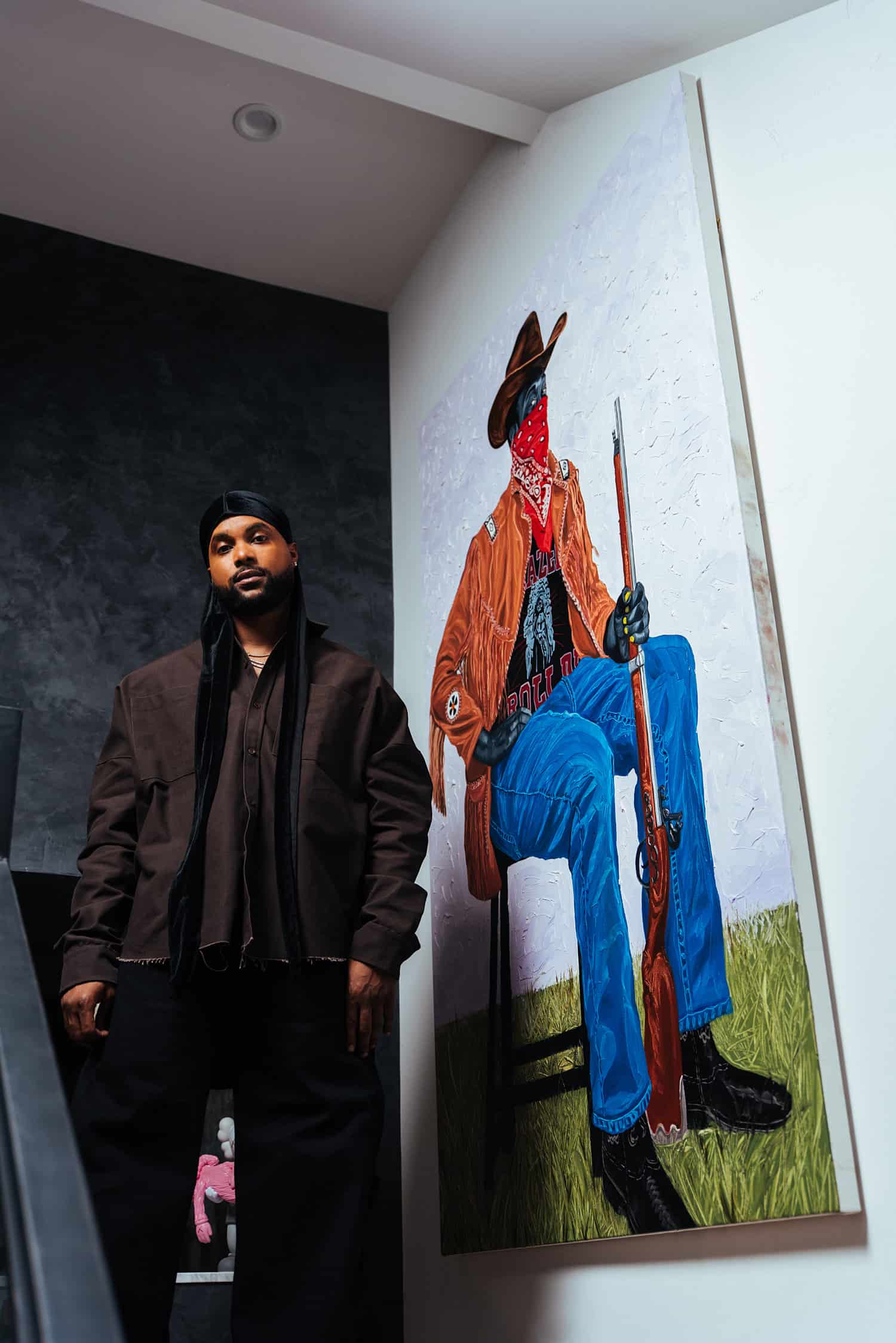
To be as clear as possible, to give many perspectives, to be as authentic as possible. People can tell when you’re not being transparent. Being able to convey a true story that connects to so many others, that means a lot to me. We’re all so much more alike than you think, and this way you’ll impact a lot of people.
When and why did you get the nickname “Steelo”?
Estilo is Spanish; it means style. My dad gave me the nickname when I was about 1 year old. He said, “This kid’s gonna be stylish”—and I did start dressing myself around 3. So that nickname came long before “Hollywood.”
Okay, let’s talk about your style. We know that you like to style yourself. What fashion do you gravitate toward?
I’d say comfort, first and foremost. And nostalgia! I love vintage pieces that have traveled. Whether it’s through art or fashion, there’s always a story to be told. I love grabbing a shirt or a pair of jeans and wondering where they came from. Music is an influence, too. It takes me to a place; those memories of pure bliss, and I remember that time when I listened to it first. It takes me back, and fashion is the same. But I’m really all over the place! [Laughs] “Homeless chic” would be my look, but Kanye [“Ye” West] has ruined that. I try to come across confident and let my personality come through.
How did you get into collecting art?
My taste has definitely expanded since I started collecting when I was young. The first major piece that made me feel like, “Wow, I’m really doing this,” was by Sam Gilliam. That was the first time I dealt with a gallery and learned the storytelling behind the work. That was me doing my due diligence and thinking about the message of the art.
What draws you into a piece of artwork?
Obviously, just looking at it, it has to grab my eye. The storytelling, the artist—that’s what draws us in, whether it’s television, film, sculpture, or any art form. For me, the connection has to be there. There has to be a sense of home. I have to be thinking what it’s trying to say if I want it to feel like it could be a piece of me.
Who are some of your favorites?
I’ll go through my collection—Amoako Boafo, Emmanuel Taku, Cornelius Annor, Jammie Holmes, and Otis Kwame Kye Quaicoe. Joel Mesler created a piece for me, which was one of my first commissioned pieces. It has the words “This Breath.” I smoke weed, but it’s about living in the moment, living for this breath, a reminder to slow down. Sam Gilliam, who I mentioned, I collect him as I’m drawn to his colors. He was one of the only Black artists out of all his peers in Washington Color School in the 1950s. He was overlooked and didn’t get the same recognition as his white peers. Then there’s Hank Willis Thomas, who talks about racial and gender inequalities and how we’re so much more alike than we think. The piece that I purchased shows how much the Black and LGBT+ communities can learn from each other.
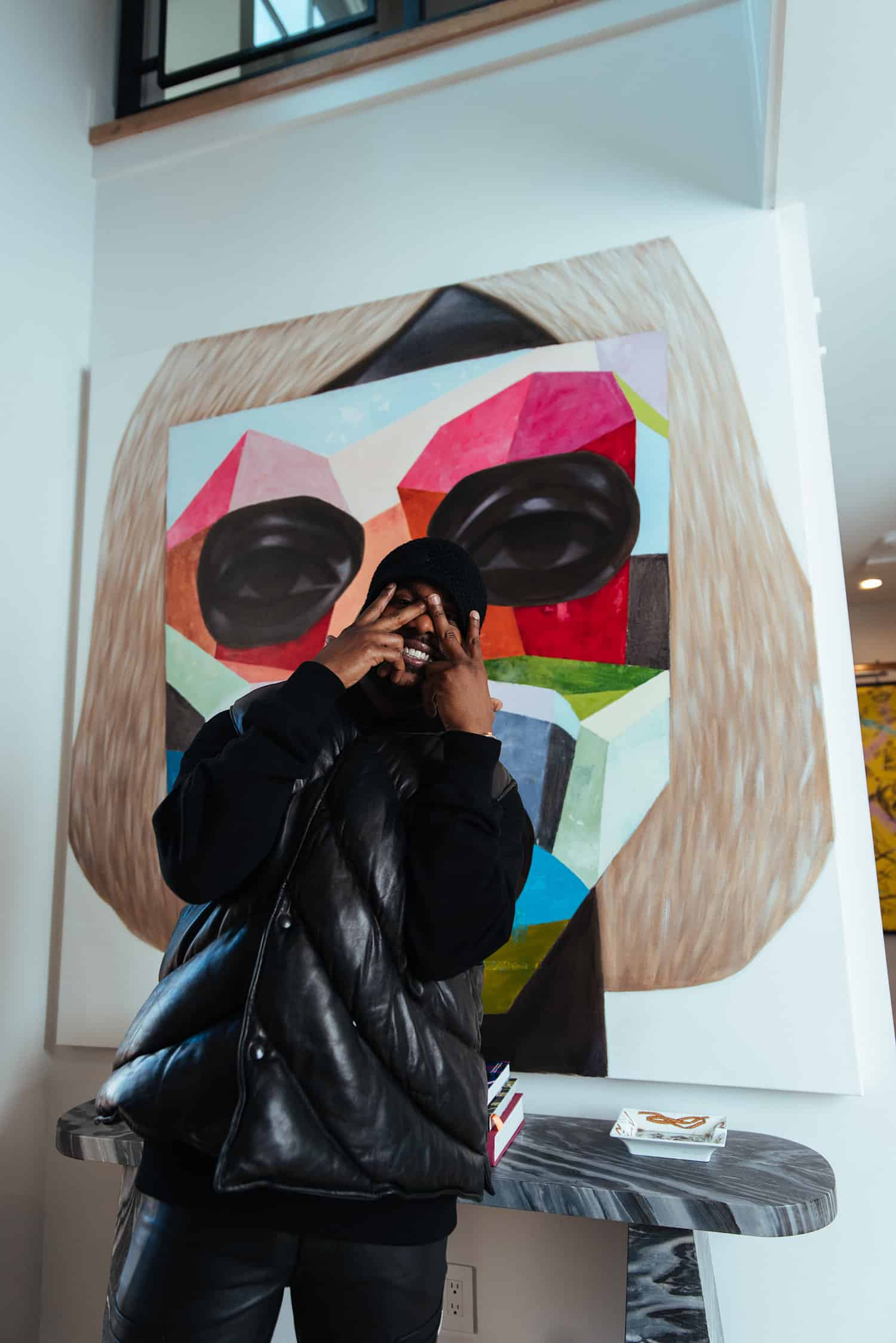
Yes! It’s crazy when you think of it—Derek Fordjour, George Condo, Barkley L. Hendricks, Nicolas Party, Stanley Whitney, and one of my homies, Jacob Rochester.
You seem like someone who’s willing to step into any role in the creative process and try your hand at new things. Where does that willingness stem from?
It comes from delusion! It’s a false reality. Maybe it’s the confidence from my childhood that gave me the belief that I can do anything. I don’t know if it’s from my parents, but I credit them. Jack of all trades, master of none—but oftentimes, it’s better than a master of one! I’m not necessarily the best, but don’t let others project anything on you or say what you can and can’t do. We’re all multilayered, so to not pull those layers back would be a disservice to ourselves.
You’ve had new music come out recently. Were you always into making music?
Yeah, as a kid I’d get on the fax machine and rap! My mom would be like, “Don’t touch that!” But I’d go hide in a part of the house and have freestyle battles with my boys down the line. I never gave it too much energy; my parents said it was the last thing they wanted me to do. We tend to have the wrong conversations about rap; I mean, think of the vocabulary of the average rapper! I was always part of the creative process as an A&R guy, but too afraid of jumping into it. Then I thought, “Who are you living for? Do it for yourself, even if nothing comes from it.” The greater things in life are on the other side of fear.
Great saying! How did your podcast, “Wine & Weed,” come to be?
My co-host, Chris Reinacher, is a big podcast and NPR guy. He was coming to me for years, way before podcasting was hot! I would say, “Dude, I’ve no interest.” Then Joe Rogan got his $100 million deal, and I thought, “You know, maybe I’m wrong! Maybe my whole life should be about podcasting!” In America, we’re so afraid to have a conversation with each other, yet it’s the only way we can progress, and the only way we can understand each other. So we have a conversation [on the show], but we take the pressure off by using the social lubrication of wine and weed!
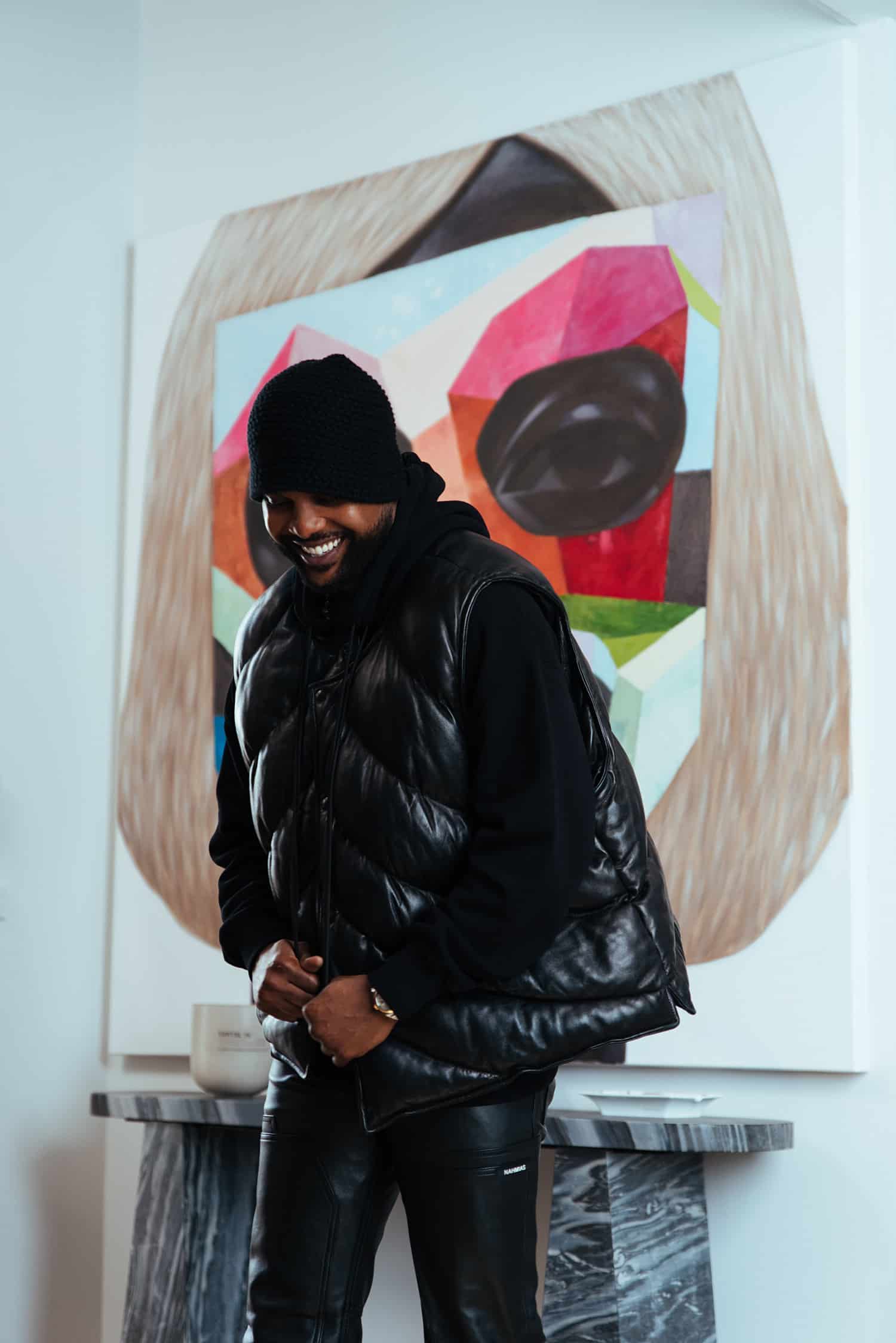
We’re not journalists, but I hope that people come away with a perspective they didn’t think about before. As a Black man, I could sit on a podcast and tell you all the inequities, but I can’t tell you about things that I’m not a voice of. The podcast is meant to bring in those different perspectives.
What’s your relationship with social media like?
I think my relationship with social media is like my relationship with anything— I need it to survive, but I wish I didn’t. It is what it is, though, and as long as I’m doing a good job at being my authentic self and as long as I never put any pressure on myself to be something I’m not, then I’ll have a decent relationship with it.
What are some dreams you still hope to achieve?
I kind of let the people and God decide. Producing more music, creating at the highest level, and more art! They’re my only dreams.
Subscribe to our newsletter and follow us on Facebook and Instagram to stay up to date on all the latest fashion news and juicy industry gossip.
